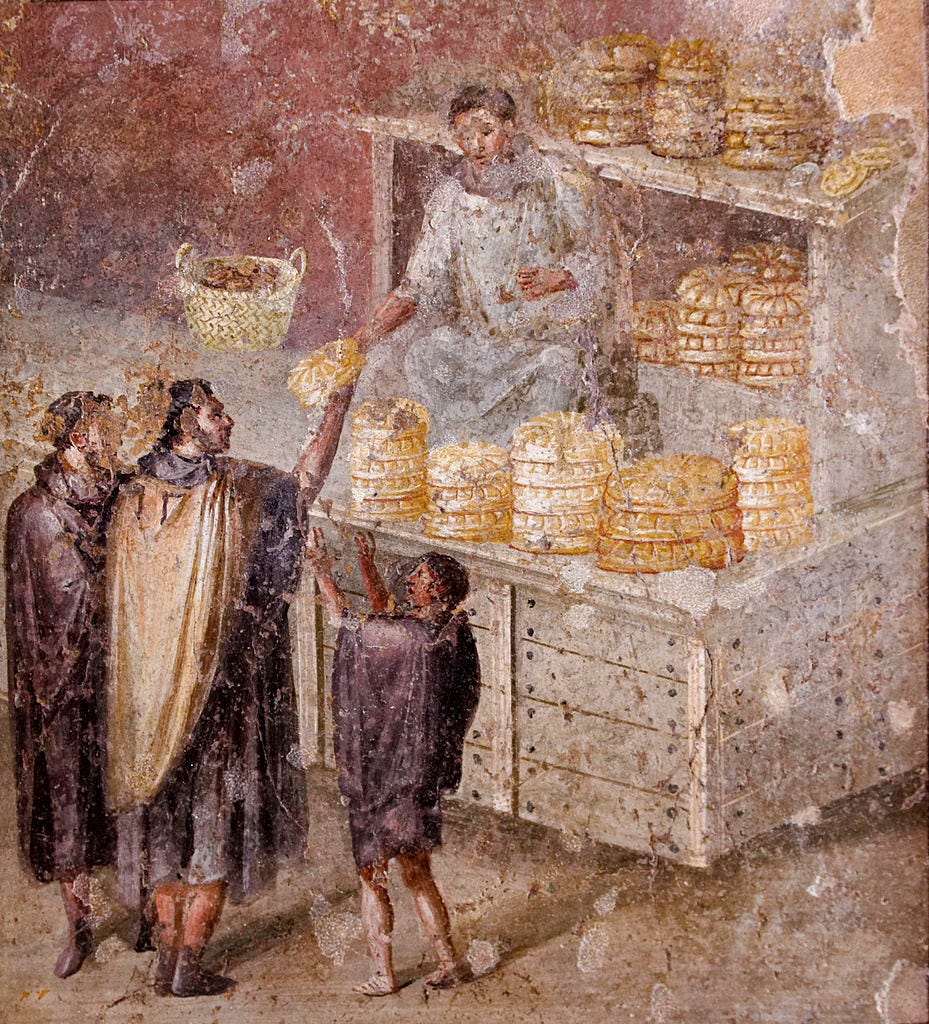Re-sent. Made a mistake on the first send.
In Wâdi Fawâkhir, along a road between the town of Koptos on the Nile and Quseir on the Red Sea, a pottery shard with some Latin writing was found, dated to sometime between AD 1 and AD 199. It was from a man named Rustius Barbarus, a baker, to a man named Pompeius.

Al-Quseir, known as Myos Hormos, during the Roman era, which includes the time period when Rustius Barbarus wrote, was the northern most major port on western shore of the Red sea. It supported a brisk trade between Egypt, India and East Africa. Not surprisingly, there was a Roman garrison at Myos Hormos. This garrison provided for 50-100 Roman soldiers [not necessarily citizens; possibly auxillia] and in the civilian community, there were warehouses, shops, and … a bakery.
According to https://papyri.info/ddbdp/c.ep.lat;;73 the subjects of the pottery shard is:
“private letter; from Rustius Barbarus to Pompeius; exchange of letters and merchandise; upcoming marriage” [my translation from the German1]
Could Rustius Barbarus have been a freed slave of a Roman citizen of the gens Rustius, like Aulus Rustius Verus in Pompey.2 I don’t assume there is any relevance to the man addressed, whose name is Pompeius. But in writing fiction, I could definitely make Rustius a freedman of the Aulus Rustius Verus of Pompey. And the name “Barbarus” would have been the kind of name a slave might have been given, since it is a Latin word meaning “barbarian” or “foreigner,” from the Greek. There are consistent misspellings of some words, which seem to imply a non-standard pronunciation of the Latin — another clue that Rustius is indeed of non-Roman birth or upbringing.
And was he supplying the garrison at Myos Hormos? Or one of the twelve way stations, manned by Roman soldiers?
I attempted a translation of the letter he wrote3, since the record doesn’t include a translation from the Latin. I think I’ve got the gist, but I’m still not sure what the “weights” are for. My first thought was that it had something to do with his marriage. I’m also assuming that the weights are for measuring product? My notes in the translation are in brackets.
Greetings from Rustius Barbarian to my brother Pompey:
[based on other letters, not literally his brother]
Why didn't you write back to me whether or not you received the bread I sent you?
[the following looks like a kind of bill of lading to me]
via Popilius and Dutupori: loaves of bread: 15
via Dragon too: loaves of rope bread: 15
and fill the vessel: 3 matia [unit of measure; a latinized greek word based on an Egyptian measure called the artaba]
I sent you bread via Theadic, the cavalryman: loaves of bread: 15
which he said he could remove [from the bill?]
I beg you, brother, to make the most beautiful [accurate? high quality?] weights for my use, and write to me what price you want for them. I will bake you bread or send you copper.
You know that I'm planning to get married.
As soon as I'm married, I will write to you, so that you may come [to deliver the weights and receive payment?] · farewell
Give my regards to Sertoriushttps://papyri.info/ddbdp/c.ep.lat;;73
Brief (privat); Rustius Barbarus an Pompeius; Austausch von Briefen und Waren; bevorstehende Heirat
In Pompeii, Italy, there was once a baker. We don’t know his name, but we know he supported Aulus Rustius Verus for the office of aedile, the Roman magistrate in charge of public works, games, buildings, and roads. In AD 79, in Pompeii, two women and 3-4 year old child died sheltering in his bakery. Next door to the bakery was a laundry used for washing and dying clothes.
[https://www.iflscience.com/ancient-roman-political-slogans-and-a-final-sacrifice-found-in-pompeii-house-70915]
The article mentions that the baker could have been freedman of Aulus Rustius Verus. If so, the naming convention for the freed slave of a Roman citizen named Aulus Rustius Verus would be Aulus Rustius and then the slave name of the freedman.
https://papyri.info/ddbdp/c.ep.lat;;73
Cleaned up a little. You can see the exact transcription at the link:
Rustius Barbarus Pompeio fratri salutem · quid est quod mi non rescripsisti si panes percepisti misi tibi · per Popilium et Dutuporim · panes · XV · item per Draconem · hamaxitem · panes · XV · et vasum explesti · III ·matia misi tibi per Theadicem equitem panes · VI quod dixit se posse tollere rogo te frater ut facias mi in ṃeos usus pondera quam formosa et scribe mihi ut pretium eorum quid vis · panem tibi faciam aut aes tibi mittam · scito enim me uxorem ducere · quam mox duxero continuo tibi scribam ut venias · vale saluta Sertoṛium




Is this a relatively recent discovery?
It's amazing how archeologists still sometimes find bits and pieces of previously undiscovered material. It's also suspenseful--what will they find next?
Thanks for mentioning this. It's not the sort of thing that gets a lot of news coverage.